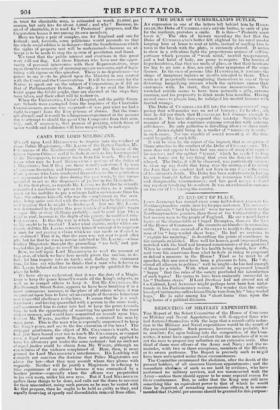CASES FOR LORD MELBOURNE.
WE call upon Lord Mmeioue xi: to inquire into the conduct of three Police Mauistrates,—Mr. LAING of the I fatten Garden, Mr. Cr, s.MBERS of the Marlborough Street, and Mr. V.; HITE of the Ignot n Square Offices ; and if he foals it such as has been reported n tin- Newspapers, to remove them from the bench. We do not what may be Lord MELitounNE's notions of the duties of Mee istrate; but if they are those usually entertained by men ,or.loon discretion and humanity, sure we are, that he cannot ;4,rsons who have conducted themselves as these gentlemen ,eeresented to have done duriin the Fast, week, In any means d to act as the dispensers of justice in the Metropolis. tia• first place, as regards Mr. LAT Na, we find that he actually ,00llitted a mechanic to prison 1hr fourteen days, as a punish- fir his inability to pay a cabman half-a-crown more than his 11ire; the cabman himself, who was the e.implainant on the occa irol, being quite satisfied with the sum offered hint by the prisoner, and begging that he might be discharged. But no; Mr. LAING was determined to deprive this poor wretch of a fortnight's Ix ages ----some fifty or sixty shillings probably—and to send him like a 1tiief to gaol, because in the depth of his poverty he could not raise LAI- a-crown. Is this the way in which Englislinem of any rank it HI ought to he treated? Under what statute, under whose au- thority did this Mr. LAING conceive himself warranted to imprison a man for not paying a claim which no one !Mile or d_ sired to tier enforced ? True it is, that the man was not soot to gaol after all ; but for that be was in nowise indebted to Mr. LAING,--whose l.other Magistrate thought the proceeding " too bad," and per- nk a ode(' this just judge to recall his sentence. New, we call upon Lord Mxi.nounNE to read the account of tilis ease, of which we have here merely given tile outline, in de- tail let him inquire into its truth ; and, finding the statement true, it him say whether he thinks that a man who behaves as :ft/fr. LUNG behaved on that occasion is properly qualified for the y,Iaee be holds. We have always understood that it was the duty of a Magis- trate to keep the peace himself towards all the King's.subjects, as well as to compel others to keep it. But Mr. CIT'AmitEns, the Marlborough Street Solon, appears to have been breaking it in a most outrageous manner, in the place of all others where it was 3.1,•nrtthent upon him to have set all example of decorous behaviour a L. respectful obedience to the laws. It seems that he is a coal- .r...euhant ; and having quarrelled with a person in the same trade, summoned him to enter into bail to keep the peace towards Ire took the opportunity of renewing his quarrel in the most manner, and would have committed an assault upon him, 1:-Hot Mr. Winne another Magistrate, restrained his arm by n.a:u force. This is the man who is especially empowered to keep tile King's peace, and see to the due execution of the laws ! The moliappy _gentleman, the object of Mr. CHAMBERS'S wrath, who la,: just been bound ever not to touch Mr. CHAMBERS, or commit Inell a legal assault upon him, then very naturally applied to have his adversary put under the same restraint ; but no such act 'I-equal justice could he obtain from Mr. WHITE, although all eye-witness of the violence complained of. Here, then, is more ground for Lord MELBOURNE'S interference. His Lordship will certainly not sanction the doctrine that Police Magistrates are sbes-e the law—that they may assault whom they please with impunity. Neither will he justify a Magistrate in refusing to take cognizance of an offence because it was committed by a brother justice—especially when the offence was perpetrated m his own room, under his own eyes. But if Lord MELBOURNE suffers these things to be done, and calls not the doers to account for their misconduct, using such powers as he may be vested with fur that purpose, then he ought to be held as guilty as they, and equally deserving of speedy and discreditable renDval from office.


















 Previous page
Previous page